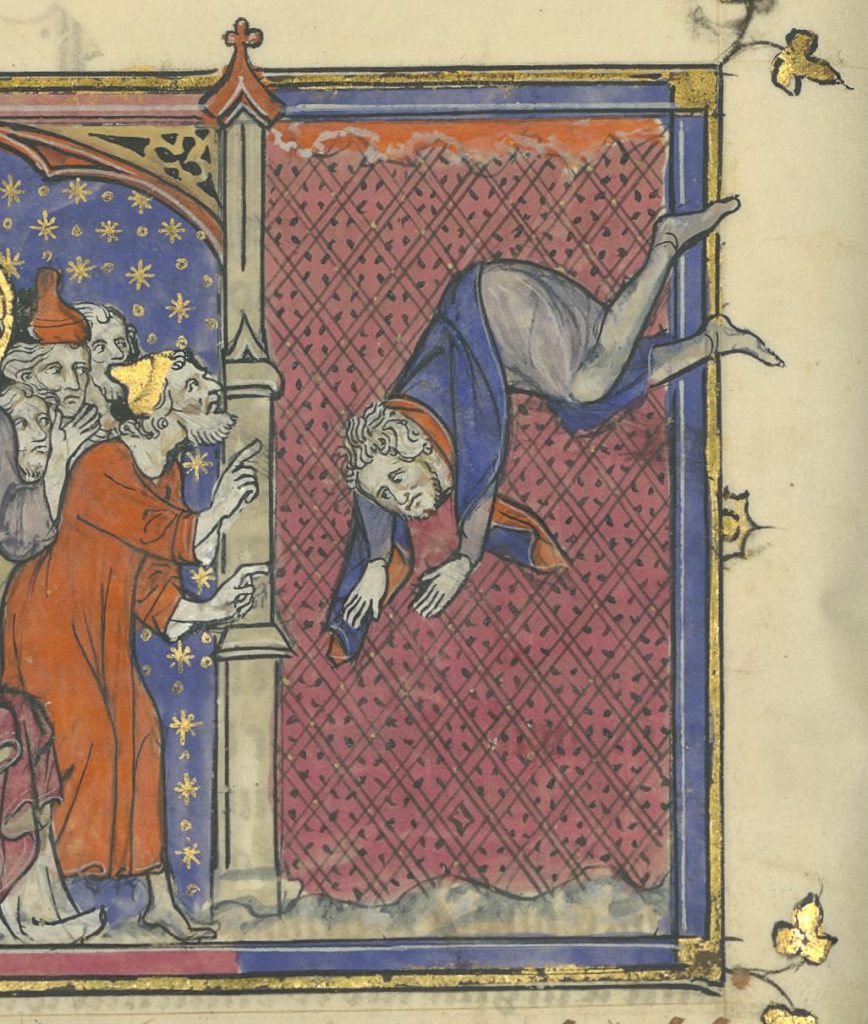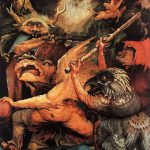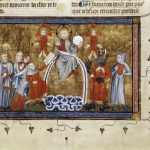
Simon Magus, also known as Simon the Sorcerer and Simon of Gitta, was a Samaritan gnostic who, according to ancient Christian accounts, allegedly asserted that he was an incarnation of God. In the various descriptions of his life, he was credited with all manner of arcane powers, including (most typically) the gift of flight.
Simon, according to the New Testament account in Acts of the Apostles 8:9–24, after becoming a Christian, offered to purchase from the Apostles Peter and John the supernatural power of transmitting the Holy Spirit, thus giving rise to the term simony (q.v.) as the buying or selling of sacred things or ecclesiastical office.
Now for some time a man named Simon had practiced sorcery in the city and amazed all the people of Samaria. He boasted that he was someone great, and all the people, both high and low, gave him their attention and exclaimed, “This man is the divine power known as the Great Power.”
They followed him because he had amazed them for a long time with his magic. But when they believed Philip as he preached the good news of the kingdom of God and the name of Jesus Christ, they were baptized, both men and women. Simon himself believed and was baptized. And he followed Philip everywhere, astonished by the great signs and miracles he saw. When the apostles in Jerusalem heard that Samaria had accepted the word of God, they sent Peter and John to them.
When they arrived, they prayed for them that they might receive the Holy Spirit, because the Holy Spirit had not yet come upon any of them; they had simply been baptized into the name of the Lord Jesus. Then Peter and John placed their hands on them, and they received the Holy Spirit.
When Simon saw that the Spirit was given at the laying on of the apostles’ hands, he offered them money and said, “Give me also this ability so that everyone on whom I lay my hands may receive the Holy Spirit.”
Peter answered: “May your money perish with you, because you thought you could buy the gift of God with money! You have no part or share in this ministry, because your heart is not right before God. Repent of this wickedness and pray to the Lord. Perhaps he will forgive you for having such a thought in your heart. For I see that you are full of bitterness and captive to sin.”
Then Simon answered, “Pray to the Lord for me so that nothing you have said may happen to me” (Acts 8:9-24) (NIV)
Having been revered by the people of northern Palestine as possessing vast preternatural powers, Simon Magus manifested his own admiration for the power of Christian evangelization when, in the New Testament story, he requested Baptism from Philip the Deacon. The biblical account concludes with Simon’s repentance and apparent reconciliation with Christianity after his condemnation by St. Peter.
Other Christian documents of the 3rd century state that Simon Magus, in the role of false Messiah, had further confrontations with St. Peter at Rome. According to legend, on challenging the Apostle before the emperor Nero (54–68), Simon fell to his destruction from atop the Roman Forum in an attempt to demonstrate his occult ability to fly. The Roman church of Santa Francesca Romana claims to have been built on the spot where Simon fell
Later references in certain early Christian writings identify him as the founder of post-Christian Gnosticism, a dualist religious sect advocating salvation through secret knowledge, and as the archetypal heretic of the Christian Church.








